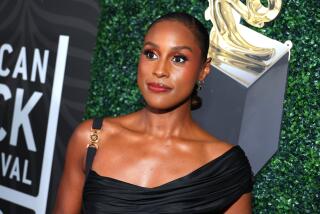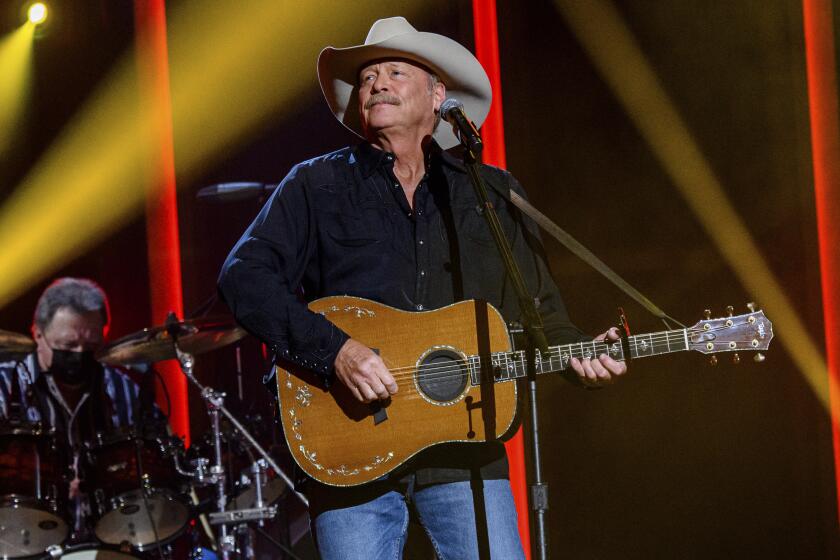Hard to tag -- and not just like a star
- Share via
People have been making assumptions about Corinne Bailey Rae since she was a child. The 28-year-old English singer-songwriter grew up in Leeds, the oldest daughter of a father from the Caribbean and a mother from Yorkshire.
“I remember in grade school, a teacher was doing an assembly on Bob Marley,” she said when she was in town to attend the Grammys as a nominee in several categories, including best new artist. “He called all the black children out of the class -- we thought we’d done something wrong. And he said, ‘I need one of you to bring in a Bob Marley record.’ He asked me, ‘Does your dad have any?’ I said, ‘No, but my mum has!’ ”
She laughed. “My dad hates reggae. He’s from St. Kitts, which is a really British island, with Victorian values. He doesn’t have a strong Caribbean accent. He didn’t play Caribbean music in the house. He was really into soul music, collecting soul 45s.”
Rae apparently inherited her father’s contradictory gene. As a teen, she led a kind of double life -- call it a double nightlife. She was absorbed in the Leeds indie rock scene, fronting an all-female band, Helen, known for being raw and loud and indebted to Courtney Love. But after Helen’s shows, Rae and her friends would sneak out in search of rhythm and blues.
“We really didn’t fit in anywhere,” she said. “And I still sort of feel that.”
Appropriately for a woman who’s always felt like the odd one out, Rae is still a victim -- and beneficiary -- of mistaken identity. Her Capitol Records debut, with its cream-colored cover and chenille-soft sound, has been embraced by fans of Norah Jones and other purveyors of sophisticated easy-listening music. But embedded within such whispery ballads as “Choux Pastry Heart” and “Like a Star” are qualities that don’t feel easy at all.
“I really like melodies that have a certain tension against the chords. I like writing things that are sort of insistent,” explained Rae, who usually writes her songs on guitar. “ ‘Like a Star’ has a very simple melody, and when you play it, it’s only about three notes for ages, and it’s quite boring. But when you hear the chords, the chords are sort of different than the melody, and it’s pulling it around and making it mean something else.”
Rae’s warm voice also has an edge. “When I was singing in Helen, the style was to have a really unusual voice,” she said, mentioning Kurt Cobain as a vocal influence. “The order of the day was to have emotion and passion and a recognizable style. So at that time that’s the only direction I would have felt comfortable going. Then later on, I realized that if I wanted to cut across all this guitar music I’d have to sing pretty loud in my range, so I developed a way of doing it so I can speak the next day. You just learn things like that.”
Considered apart from the marketing plan that’s put the album on Starbucks counters nationwide, Rae’s fragile, deliberately imperfect music brings to mind indie gamines Leslie Feist and Keren Ann. Up-tempo cuts including the definitively summery “Put Your Records On” go in a neo-soul direction, but even these more radio-friendly songs remain pristine. She likes to expose the bones of her songs, to keep them uncalculated.
“I haven’t gone out of my way at all to make the lyrics sound literary,” said Rae, who’s currently on tour with John Legend and opens his shows Tuesday at the Bren Events Center in Irvine and Friday at Gibson Amphitheatre. “I want them to be close to my actual speaking voice. I want the pattern of the singing to be conversational, and not pull out a word and go, ‘ahhhhhh,’ ” she says, letting loose with a big vocal run. “You never do that in life! I don’t want to extend the words to fit a melody; I want them to be chatty, I guess.”
Calling her lyrics “chatty” is the kind of unpretentious move that makes Rae endearing in person but could damage her star aura. Talking about everything from her love of Toni Morrison to her marriage to saxophonist Jason Rae, she projects zero artistic arrogance or personal vanity. Back when indie rock was king (and queen), such normalcy was considered cool; now, it’s often condemned as dull.
The path Rae took in writing and recording her album doesn’t help her hipster credibility. After years of toil with Helen and a band breakup that left her devastated -- and after some experimentation on the jazz circuit, which she’d discovered checking coats in the now-defunct Leeds club the Underground -- she signed a publishing deal and started working with professional songwriters including Rod Bowkett and Steve Chrisanthou, who’d helped generate hits for pop queens Christina Aguilera and Dido.
“I learned tons from working with other people,” she said. “But sometimes it wasn’t the most enjoyable experience. I’d come down on the train and walk into a room with a guy that I’ve never met before, and have coffee, and sit in a room with a guitar, and go ‘OK, let’s write a song.’ ”
Chrisanthou, who’s also worked with boy-band alum Simon Webbe and former child prodigy Charlotte Church, recalled that “Corinne had already written ‘Like a Star’ when I first heard her, so as far as I was concerned she was already a mature and gifted songwriter.
“From the very start she was hands-on with everything, developing her writing, musical and production skills all at the same time, then finally taking over this blue planet of ours ... and leaving me out of a job!” said Chrisanthou, who produced “Like a Star” and co-wrote “Put Your Records On” with Rae and his partner, John Beck.
These encounters with industry pros took Rae far from her daily life as part of the Leeds jazz-rock scene. Her heart remains there.
“My friends are the greatest musicians that you’ve never heard of,” said Rae. “Brilliant bass players and really beautiful keyboard players and really soulful singers. I played loads of music with these people and just hung around with them. When I was 18 they were 22 and my heroes. I’m still their fan.”
Rae and her husband own a home in Leeds and return as often as her newfound fame allows. The spirit of a scene that’s big enough to thrive but small enough to stay mostly under the music-biz radar suits Rae, who’s instinctively hostile to the glitzy trappings of the mainstream.
“In Leeds, there are a lot of working people who are also artists,” she said. “A woman might be a painter, for example, but she’ll work in the library. We go to her exhibitions, support her shows, and think of her as an artist. I like that people prize their art so highly that they’re willing to earn their money in a different way.”
Rae herself is torn between such grass-roots bohemianism and the success that’s come with her carefully crafted album. She wants her next album to be more adventurous, closer in spirit to works by Joanna Newsom, Beth Orton and Bjork, genre-defying artists she admires. But she’s also keen to reunite with her songwriting team.
“I would like to work with all those people again,” she said. “Simply because they believed in me. I’d turn up in a track suit, with my hair scraped back and spots on my face, and they’d set aside three days from their work with Dido or Natasha Bedingfield and set me up in their studio with their engineer, because they believed the songs we were doing would see the light of day.”
The main thing Rae knows and wants others to accept is that she’s at only the beginning. In our talk she cited Nina Simone as an influence. Then she stopped herself. She realized she was making big assumptions.
“It’s silly, me saying, ‘Oh, yeah, all these amazing people, I can feel them in what I do,’” she said. “I’m just starting out in terms of recording music. I’d like to be able to look back after loads and loads of records and say, ‘I feel like I’ve developed. And that I’ve written some good songs.’ ”
*
More to Read
The biggest entertainment stories
Get our big stories about Hollywood, film, television, music, arts, culture and more right in your inbox as soon as they publish.
You may occasionally receive promotional content from the Los Angeles Times.










